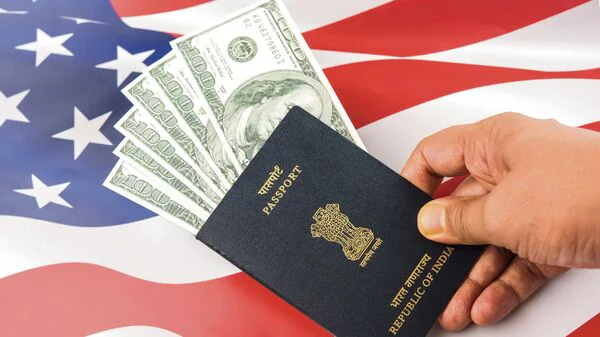H-1B Fee Hike: Indians Stand To Lose The Most, Says Visa Consultant As Trump Slaps $100,000 Fee
The fee which was previously around a thousand dollars is now raised to $100,000, a move that will hit Indian workers the hardest, ANI quoted Bikram Chabhal, president of the Association of Visa and IELTS Centres (AVIC), as saying.
The H-1B program offers around 65,000 visas annually to employers bringing in temporary foreign workers in specialised fields, and another 20,000 visas for workers with advanced degrees, among which India was the largest beneficiary with a 71% share of approved beneficiaries.
Visa consultants worried about the impactChabhal noted that 70% of H-1B visa holders are Indians, followed by Chinese nationals.“Previously, the total fee was $215, plus another $750. Now, it translates to eighty-eight lakh plus in Indian rupees,” he told ANI.
He further added, "I believe these companies will have to struggle a lot in the future. If a company has to pay a fee of one lakh dollars every year, then companies won't be able to afford that much money."
Chabhal stressed that Indians stand to lose the most after this move. "The biggest disadvantage of this seems to be for Indians, as Indians used to go extensively on this visa... After receiving those visas, they would then obtain green cards and become American citizens. This will impact them significantly," he noted.
Also Read | Radhika Gupta reacts to Trump's H-1B visa fee hike: 'I wouldn't want to...'Speaking of the future outlook, despite the negative short-term impact, he suggested that the policy shift could indirectly help India. "In the future, this will benefit India more because if specific workers return to India, they will be able to do something good for India. However, America will not find specialised workers in America..." he said.
Why did US hike the visa fee?Chabhal's remarks came as US Commerce Secretary Howard Lutnick announced details of the new H-1B visa fee during a press conference, describing the decision as a strategy to get rid of lower-skilled training positions while preserving opportunities for highly skilled workers .
"A company that wants to buy an H-1B visa... it's USD 100,000 per year," Lutnick explained. The visa maintains its current structure: three years with one possible renewal for a total of six years.
Also Read | Helios Capital founder shares amusing boardroom scenario on H-1B visa fee hikeThe fee, which applies to all H-1B positions regardless of salary or skill level, is designed to make the programme viable only for roles that justify such a substantial cost. "No longer will you put trainees on an H-1B visa -- it's just not economic anymore. If you're going to train people, you're going to train Americans," Lutnick said.
Implications for Indian IT sectorThis sudden change is expected to significantly impact Indian IT services companies like Infosys, TCS, and Wipro.
Also Read | Trump H-1B visa fee hike: How tech stocks may react on Monday?Meanwhile, Industry body Nasscom said the US' move will impact India's technology services companies as business continuity will be disrupted for onshore projects that may require "adjustments".
"While we are reviewing the finer details of the order, adjustments of this nature can potentially have ripple effects on America's innovation ecosystem and the wider job economy," the apex body said.
Nasscom also flagged concerns over September 21 timeline for implementation saying a one-day deadline creates considerable uncertainty for businesses, professionals, and students across the world.
Legal Disclaimer:
MENAFN provides the
information “as is” without warranty of any kind. We do not accept
any responsibility or liability for the accuracy, content, images,
videos, licenses, completeness, legality, or reliability of the information
contained in this article. If you have any complaints or copyright
issues related to this article, kindly contact the provider above.
Most popular stories
Market Research

- Ozak AI Partners With Pyth Network To Deliver Real-Time Market Data Across 100+ Blockchains
- Blockchainfx Raises $7.24M In Presale As First Multi-Asset Super App Connecting Crypto, Stocks, And Forex Goes Live In Beta
- B2PRIME Secures DFSA Licence To Operate From The DIFC, Setting A New Institutional Benchmark For MENA & Gulf Region
- BTCC Summer Festival 2025 Unites Japan's Web3 Community
- From Zero To Crypto Hero In 25 Minutes: Changelly Introduces A Free Gamified Crash Course
- BILLY 'The Mascot Of BASE' Is Now Trading Live On BASE Chain






















Comments
No comment